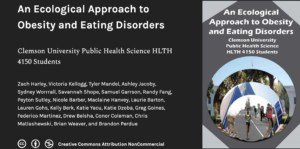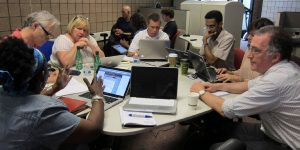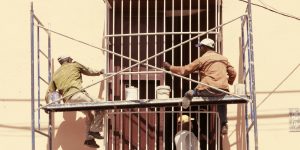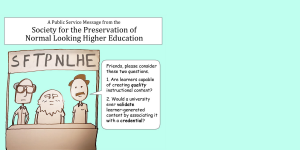An Ecological Approach to Obesity and Eating Disorders is the work of students of Clemson University’s Public Health Science in collaboration with Clemson Libraries. The students wanted it to be an information guide on various weight-related challenges for the general public. The goals of this project were to meet the course (HLTH 4150 – […]
Non-majors Science Students as Content Creators
For the past three semesters, students in CORE101: Scientific Investigations at Roger Williams University in Bristol, RI have been creating websites on science topics they themselves have deemed important to society. The websites are designed to take the place of a course textbook in this course for non-majors, and are completely written, designed, and edited […]
Collaborative Syllabus Design: Students at the Center
“Democratically co-creating learning outcomes with students, based on their goals for the class, situates them at the center of your pedagogy.” – Christina Katapodis I have been meaning to write about collaborative syllabus design for ages. This week’s workshop on learner-centered syllabi in GEDI / Grad 5114 combined with a very cool article by Christina Katopodis on Writing […]
The Marginal Syllabus and Open Pedagogy
Are you already familiar with the Marginal Syllabus? The 2018-19 syllabus titled “Literacy, Equity + Remarkable Notes = LEARN” has been announced and can be accessed here. What is the Marginal Syllabus? Since 2016, the Marginal Syllabus has convened and sustained online conversations with educators about equity in education through open and collaborative web annotation. […]
Against “Product-Based Learning”: Open Texts are Never Finished
This year, I am part of faculty group tasked with designing, piloting, and assessing a new capstone to our General Education program. We are imagining this capstone as an “integrated” course, one that brings together students from a range of majors to work in multidisciplinary groups on an outward-facing project. In our initial meeting, the […]
How Public? Why Public?
In the Interdisciplinary Studies program where I have begun working, we encourage students to go public with their work. It’s a common idea well beyond interdisciplinary studies: for students to feel more engaged with the work they do, to feel that what they are doing matters, they need to do that work for an audience […]
Editing Wikipedia in the Classroom: Individualized Open Pedagogy at Scale
Strada and Gallup released a study last month, From College to Life: Relevance and the Value of Higher Education, which seeks to understand students’ perspectives on the value of their higher education. It’s the first national study of its kind, drawing data from more than 250,000 interviews with people from more than 3,000 educational programs. Subjects, […]
Open and Closed: The Class That Sank
I teach at a small liberal arts college in central New Hampshire as a Teaching Lecturer. It is one of the best parts of my life—I have the opportunity to work with college students, deepen my understanding as a writer, and am afforded the support of a caring and thoughtful department. With six classes of […]
Redesigning a Leadership Course
I have discovered you can be planning open pedagogy and not even know it! I am excited to have been working with a colleague, Kaitlin Kozlowski, to redesign and co-teach a Nursing Leadership course. We began with a discussion about what learning experience we wanted our students to have. We decided the key element would […]
Open Educational Practices and Micro-Credentialing: A pilot project
(Disclaimer: Opinions are mine.) At the University of Wisconsin-Extension CEOEL, I work on a competency-based micro-credentialing program called the University Learning Store(ULS). It was conceived of as an online store for learning, where students can purchase mini-courses both to acquire and to be assessed on discreet competencies. I suspect there will be more programs like the […]









